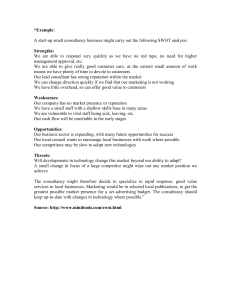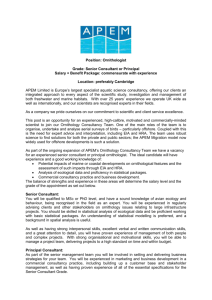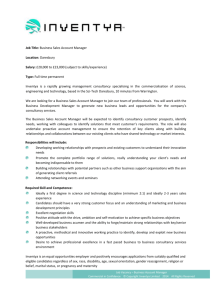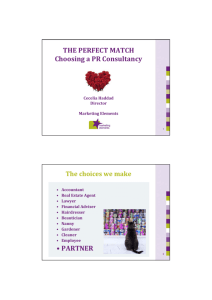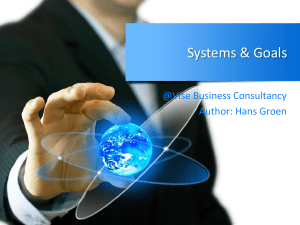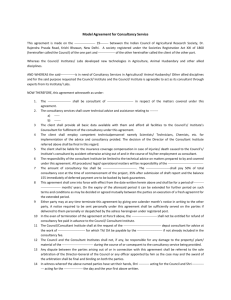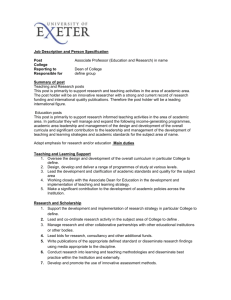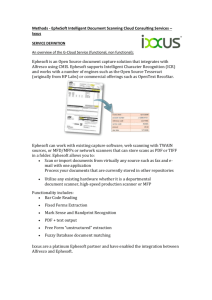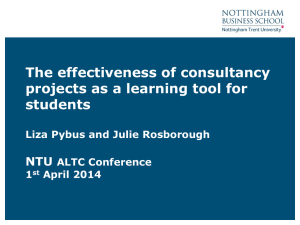Role of a Consultancy
advertisement
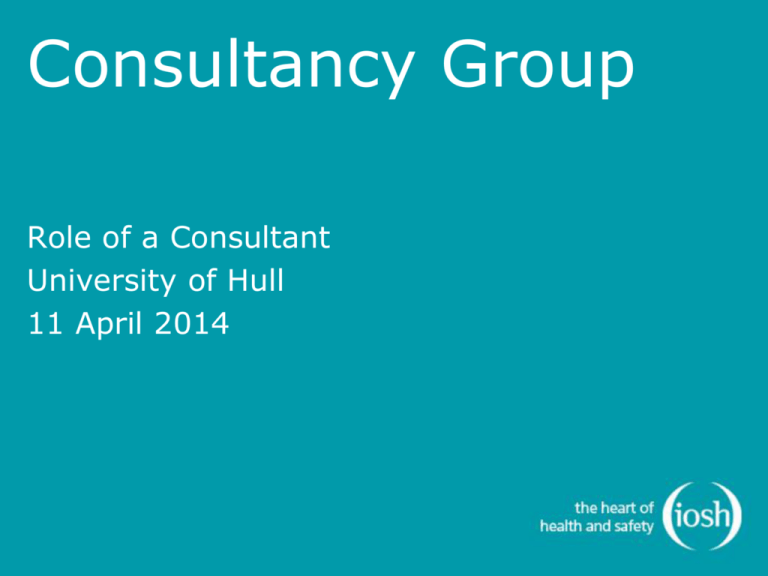
Consultancy Group Role of a Consultant University of Hull 11 April 2014 Objectives - Providing personal development opportunities - Assisting with business support - Changing perceptions of consultancy - Raising awareness of the consultancy group - Supporting IOSH corporate strategy Activities for 2014 - Conduct review of consultancy guides (complete) - Webinars: Professional indemnity insurance (complete) (http://www.iosh.co.uk/Membership/Our-membership-network/Our-Groups/Consultancy-group/Past-Events.asp Second webinar planned for Autumn 2014 - Events: Surviving in Consultancy (Planning two / three events) - Webinar: (Planning for Autumn) Definitions A person who provides expert advice professionally. (Oxford Dictionaries) Someone who has influence over an individual, group, or organisation, but who has no direct authority to implement changes. (Peter Block) Definitions Internal Consultant: Someone who operates within an organisation but is available to be consulted on areas of specialism by other departments or individuals (acting as clients); External Consultant: Someone who is employed externally (either by a firm or some other agency) whose expertise is provided on a temporary basis, usually for a fee. As such this type of consultant generally engages with multiple and changing clients. Consultancy Money Advantages Disadvantages Lifestyle Earn what you want Flexibility of remuneration Freedom Challenge Achievement No guaranteed income No holiday or sick pay No pension, car, benefits Personal liability Solitude Danger of overwork Unpopular tasks as well Key attributes Essential - Organisational skills Social skills Positive attitude Professionalism Desirable - Consultancy experience An identified market and product Network of contacts Established reputation in your sector Setting up your own consultancy - Before your take the plunge - Who will you work for? - What will you do? - Can you deal with difficult personalities and prejudices? - What type of consultancy - Full-time employed (by others) - Legal entity (sole trader, partnership, limited company) - Making your decision - Risk versus return - Can you afford to lose your salary and benefits Where are you going to work - Home office - Pay as you go office space - Own office - Shared office - Client premises Insurance - Employer liability - Public liability - Professional indemnity - Motor insurance (even if private car) - Contents insurance Finance - HMRC (VAT / Inland Revenue – IR35) - VAT registration (£79,000 for flat rate scheme) - Getting paid (30 / 60 / 90 days) - Banking - Accountant - Cash flow / budgeting - Purchase orders / written instructions / terms and conditions IT / Data Protection - Suitability - Access to data - Maintenance - Filing - Storage - Back-up Marketing and business development - Stick to what you know - Become the expert - Be helpful - Refer work to people - Remember people buy people – relationships are vital - Clients like reliability, honesty and integrity - Under-promise and over-deliver Preparation - Review your current contractual obligations - Notice period - Restrictions - Get confirmation of agreements in writing - Consider terms and conditions - Engage a potential client base before you set up - But accept that work is not guaranteed - Consider phased introduction (part time) - With current employers consent Preparation - What rate? - Remember the following: - All costs – HMRC, insurance, equipment etc. - Consider you may not be fully employed - Equivalent of holiday pay, sickness, pension etc. - It can be difficult to increase your rate later IOSH Code of Conduct - Opinions should be honest, objective and reliable Maintenance of CPD Understand limitations Accept professional responsibility for all work Action when professional advice is not followed Improper use of membership / designations Avoiding conflict of interest Confidentiality IOSH Code of Conduct (Consultants) - Maintain confidentiality Agree the scope of work Agree working and charging arrangements Not work for more than one client (on same project) simultaneously Not solicit improperly for work Expert witness (confine to specialism) Protect intellectual and property rights - Right to stop providing services Good Practice Guide - Initial briefing and defining the project Developing your proposal Project proposal - the details Getting appointed and agreeing terms Be clear on what is being charged Implementation Changes Invoicing Evaluation, follow up and learning References - Institution of Occupational Safety & Health Code of Conduct (March 2013) Consultancy – good practice guide 2014 Getting help with health and safety March 2014 www.iosh.co.uk/groups the heart of health and safety

